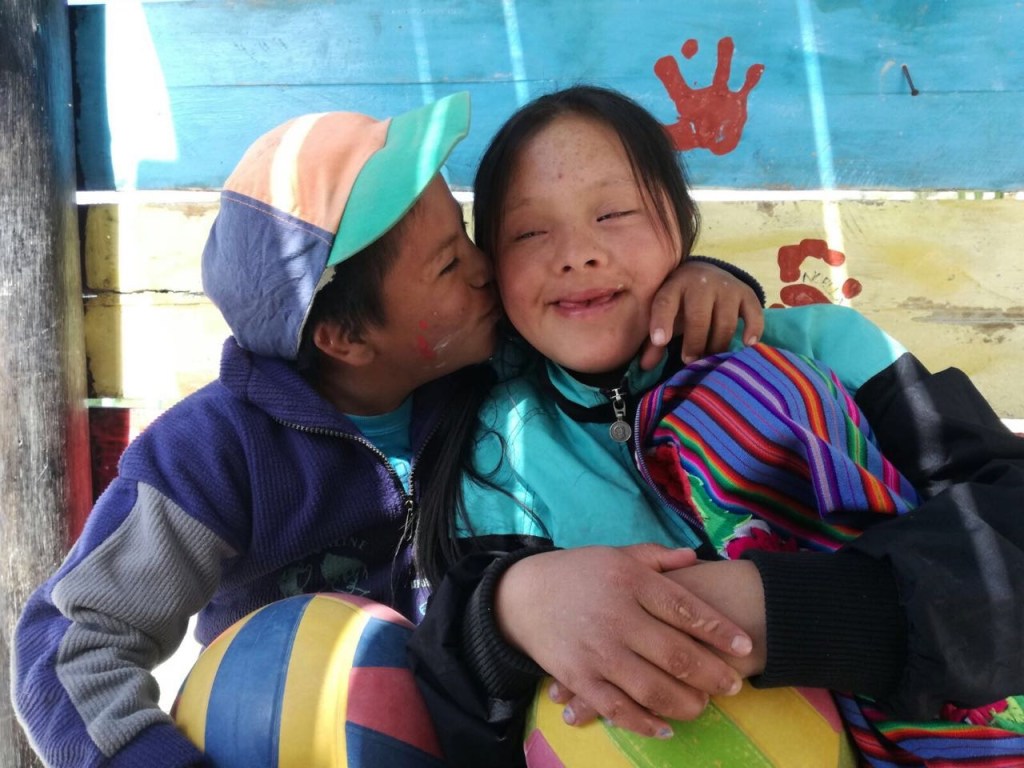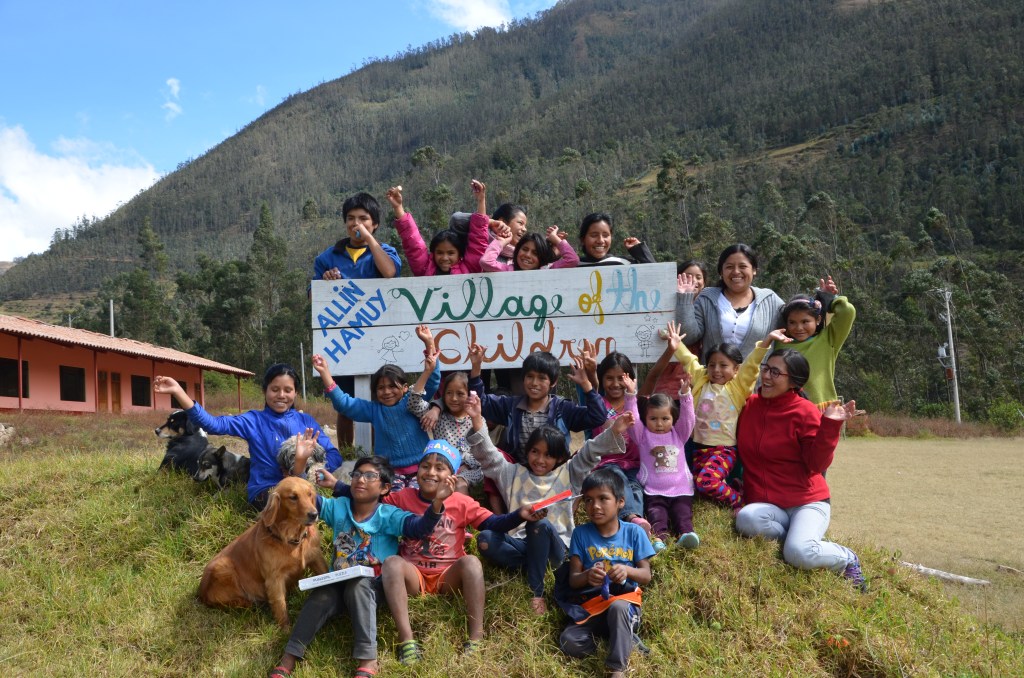Oye LENA is an educational project located in Curahuasi, Peru in the heart of the Andes mountain range at an altitude of 2,600 metres. It was founded on 15 April 2012 and has been an officially registered NGO in Peru since 8 February 2013. Since July 22, 2020, the activities have been supported by the corresponding association, Oye LENA Belgium vzw.

Oye LENA is short for “Oye Loquitas EN Acción!” which freely translated means: “Listen up, we are taking action!”
Oye LENA tries to tackle poverty and social inequality through quality education. Every child has the right to a quality education, focused on personality development, regardless of their own capabilities and limitations and regardless of the place and culture in which they grow up. Children from underprivileged families and ethnic minorities, children with a disability and children in rural areas should have the same opportunities as others.
Oye LENA consists of four educational projects, that actually form one entity.
- Oye NIÑOS, afterschool EDUCATIONAL project,
- Oye JUNTOS, children with or without a disability TOGETHER
- Oye LOCAL, a partnership with the LOCAL population to work towards better education
- OYE MUNDO: Create WORLD citizens out of volunteers
Oye NIÑOS afterschool education for TODDLERS, PRIMARY and SECONDARY students:
Since February 2013, Oye NIÑOS has been providing education to 20 preschoolers in the afternoon. Since 2017, we have also been guiding them through their primary and secondary education. Students in the 1st and 2nd grades receive additional lessons in math and language, alongside arts and crafts, games, and sports to establish a solid foundation. Older students have more freedom and can choose from various activities such as games, crafts, sports, English lessons, reading, hygiene, and also receive regular activities like homework assistance and sexual education.
Starting in January 2023, we weekly welcome five to ten adorable babies, aged 6 to 24 months, accompanied by their mothers and/or fathers. During these gatherings, we discuss the importance of proper nutrition and parenting, engage in enjoyable games, build the bond between parent and child, and work on the fine and gross motor skills of the babies. To top it off, they receive a tasty fruit or vegetable puree each time. This significant development means that children at Oye LENA can now begin as early as 6 months and progress through all subsequent groups. Unfortunately, older children cannot join due to higher demand than what we can accommodate.
We made a conscious choice to focus on girls in our nursery project, because they still receive fewer opportunities in society and because considerably fewer girls go to nursery schools. We want to break this pattern.
We are convinced that participation and involvement of parents is of the utmost importance. We try to stimulate this by involving them in the project’s daily activities on the one hand and by organizing monthly parent-teacher conferences on the other hand. We organize workshops in which parents learn how to stimulate their children and their development every day. However, there is also time left to talk about education and upbringing in general, the difficulties that come with it and the importance of health and healthy food. Moreover, we encourage parents to enroll their children in nursery schools and we help them find one. For parents of children with disabilities, there is an additional monthly meeting specifically focused on their needs.

Oye JUNTOS children with or without a disability TOGETHER:
Since August 2014, we have been welcoming children with a disability in our classrooms. Every day, a couple of children with varying mental and motor disabilities join our toddlers and participate in the activities. The number of children has increased steadily over the years. Since the beginning of 2017 we have been working with nine children with a disability: two with Down’s syndrome, two visually impaired, three with cerebral palsy, an autistic boy and a girl with fetal alcohol syndrome. In the mornings, they get individual education and special activities, such as physiotherapy, Sherborne therapy, controlled multisensory environment therapy (snoezelen), etc. In the afternoon, some students with mental or physical disabilities join the preschoolers or primary school children.
Through inclusive education we teach our toddlers (as well as the disabled kids) tolerance, responsibility towards each other, respect for and the value of differences.
We also organize a Siblings’ Day every month, with the brothers and sisters of the disabled kids, in order to enhance the relationship between the siblings, give psychological support if necessary and involve the family.

Oye LOCAL a partnership with the LOCAL population to work towards better education:
Oye LOCAL tries to enhance contacts with the local population and local organizations. On the one hand, Oye LENA wants to address educational topics and exchange working methods, and on the other hand it wants to work together with health organizations towards the child’s full development. The aim is to exchange know-how, materials and experiences.
The intention of the meetings with educational institutions is to create a mix of Peruvian and Western educational methods which is relevant for our specific target group: children who speak a different language at home and children whose parents are low-skilled, do not recognize the importance of education and do not stimulate the development of their child.
We also want to safeguard the health of our kids together with local health organizations (Centro de Salud & Diospi Suyana Hospital). In practice, this mostly means dental care and avoiding malnutrition and anemia, but we also intervene in the event of acute illness or accidents. A child can only be happy and learn when he or she has a healthy body.

Oye MUNDO create world citizens out of volunteers:
Oye Lena works mainly with volunteers: people from all over the world who help out for a while. These volunteers are key figures: thanks to them, every day we are able to do what we want to do for or with our children. We want to give these volunteers something in return.
We not only want to give them the love and smiles of our children, we also want them to experience how things can be different, we want to give them values that are not always well-respected by all (respect, honesty, team spirit, positivity). We also want to open their eyes, “fill their backpacks” with images and ideas that will last forever so that they can go home richer and carry this message out. In this way, we slowly build a network of ambassadors of Oye Lena, a group of world citizens who choose to be consciously aware and to help make our world a better place.

Why do we do what we do?
Why education?
Education is seen as the building block of development anywhere in the world. A good education leads to informed choices, more knowledge and better jobs.
Education policy is strongly intertwined with poverty. There is an increased chance of sound economic growth when there are good and specific investments in education. Certain specific groups could especially benefit from this (e.g. women, the poor, people in the countryside and the indigenous population).
Why toddlers?
All experts agree that an important part of a child’s development takes place before they are six years old, on the cognitive level as well as on the motor, communicative and social-emotional level. During this crucial time for brain development, the foundation for future learning ability is laid. In other words, good nursery education is of the utmost importance for a successful school career and opens doors to new opportunities in life.
Why girls?
(Source: Plan België, 2012)
Why primary school kids?
In late 2017, the project began offering homework assistance twice a week to some children who attend primary or secondary school in the mornings. Often, these children struggle to do their homework at home and lack the opportunity for additional explanations when needed. When the pandemic struck, these children could no longer attend school and had to rely on remote learning, which did not work as well as hoped, resulting in a significant learning gap. Therefore, the project decided to intervene.
In addition to homework assistance, mathematics, and communication lessons, attention is also given to art classes, sexual education, sports classes, and more. This is because many students attend school only in the morning and receive purely theoretical lessons, while education is much more than just solving problems. By offering this comprehensive curriculum, we work on the child’s complete development, helping them discover their interests, talents, and weaknesses.
Why children with a disability?
The needs of children with a disability are more severe for a family and the society. In traditional Peruvian society, these needs are often neglected. The main reason for this is the idea that disabled children are a punishment from God or the conviction that the investments needed for extra care do not outweigh the benefits of this care. This leads to a society where disabled children are excluded from social life. The chance of neglection, malnutrition and a shortage of development opportunities is significantly higher for these kids. There is a school for children and youngsters with a disability in Curahuasi, but unfortunately, they do not have enough teachers for the number of kids in need and they have little to no knowledge of the different target groups. This has led to several complaints, and has resulted in a school that only offers shelter. The abilities and talents of these children are not stimulated and they are not motivated enough. Children that would be able to read or write are not being taught this at this school.
